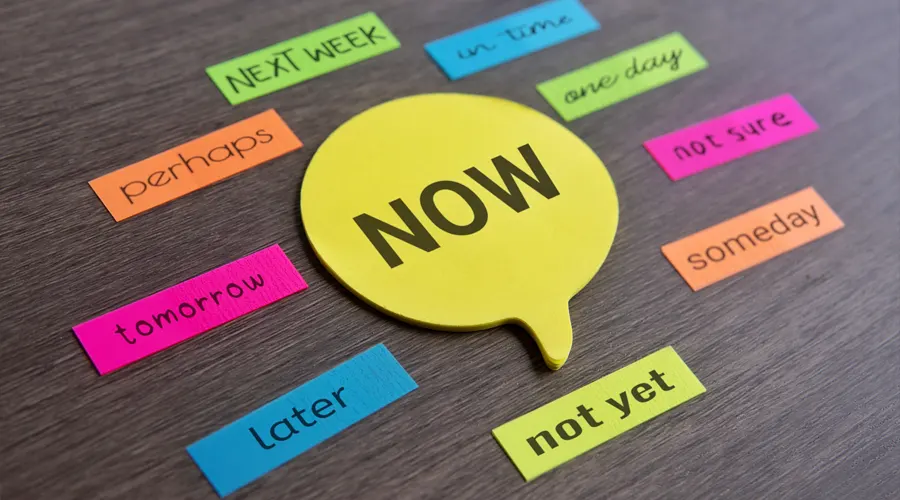Understanding Procrastination: What Is It?
Procrastination is the habit of delaying tasks that need to be completed, often until the last minute or even past the deadline. It’s not merely a time management issue but a complex behavior that involves emotional regulation and self-control.
Procrastination can manifest in various aspects of life, including work, school, household chores, and even personal goals. It is crucial to understand that procrastination is not just about being lazy or disorganized.
It is a complex behavior driven by the need to avoid discomfort or failure. By recognizing procrastination as a multifaceted issue, individuals can begin to address its underlying causes and work towards overcoming it.

Common Causes of Procrastination
Several factors contribute to procrastination, each of which can vary depending on the individual.
One of the most significant causes is perfectionism. Perfectionists often delay starting tasks because they fear that their work will not meet the high standards they set for themselves. This fear of failure can be so overwhelming that it paralyzes them, leading to procrastination.
Another common cause is fear of failure. People who fear failure may procrastinate because they are afraid of not succeeding. This fear can be deeply ingrained, often stemming from past experiences or high expectations set by themselves or others.
Lack of motivation also plays a critical role. When a task seems uninteresting, tedious, or irrelevant, it can be challenging to find the motivation to start or complete it.
Poor time management skills can exacerbate procrastination. Individuals who struggle with organizing their time effectively may find themselves overwhelmed by their workload, leading to delays in starting tasks.
Finally, distractions—especially from technology and social media—are significant contributors to procrastination. With constant notifications and endless content to consume, it’s easy to lose focus and delay important tasks.
The Psychological Factors Behind Procrastination
Procrastination is not just a surface-level behavior; it is deeply rooted in our psychology. One major psychological factor is cognitive distortion. This occurs when individuals have irrational beliefs or thoughts that lead them to procrastinate.
Present bias is another significant psychological factor. This is the tendency to prioritize immediate pleasure or comfort over future rewards.
Mental health conditions such as depression, anxiety, and ADHD can also contribute to procrastination. Depression can cause feelings of hopelessness and a lack of energy, making it difficult to start or finish tasks. Anxiety can lead to avoidance behaviors, where individuals delay tasks to avoid the discomfort of anxiety-provoking situations. ADHD can make it challenging to focus on tasks, leading to procrastination as individuals get distracted or overwhelmed.
How Procrastination Affects Your Productivity
The impact of procrastination on productivity cannot be overstated. When you procrastinate, you delay important tasks, which often leads to a last-minute rush to complete them. This rush can result in poor-quality work, missed deadlines, and increased stress. Over time, chronic procrastination can severely damage your productivity, making it difficult to achieve your goals and meet your responsibilities.

Procrastination can also lead to a vicious cycle of stress and guilt. When you delay tasks, you create a backlog of work that becomes increasingly difficult to manage. This backlog can cause feelings of guilt and anxiety, which in turn lead to more procrastination. As tasks pile up, the pressure to complete them grows, leading to even more stress and reduced productivity.
Different Types of Procrastinators
Understanding the different types of procrastinators can help individuals recognize their specific procrastination habits and develop strategies to overcome them. Here are some common types of procrastinators:
- The Perfectionist: Perfectionists delay tasks because they fear their work will not meet their high standards. They often spend excessive time refining their work, which leads to delays in completion.
- The Dreamer: Dreamers put off tasks because they struggle to focus on details. They may have grand ideas but find it difficult to follow through with the necessary steps to achieve them.
- The Defier: Defiers resist tasks they feel are imposed on them. They may procrastinate as a way to assert control over their time and decisions.
- The Worrier: Worriers avoid tasks because they fear change or stepping out of their comfort zone. They may procrastinate to avoid the anxiety associated with new or unfamiliar tasks.
- The Crisis-Maker: Crisis-makers thrive under pressure. They often leave tasks until the last minute because they believe they work best in high-stress situations, although this can lead to burnout and poor-quality work.
By identifying which type of procrastinator they are, individuals can tailor their approach to overcoming procrastination, focusing on strategies that address their specific challenges.
Procrastination vs. Laziness: Key Differences
While procrastination and laziness may seem similar, they are fundamentally different.
Procrastination is an active process where individuals choose to delay a task despite knowing that doing so could have negative consequences. It often involves a desire to complete the task but an inability to start due to fear, perfectionism, or other psychological factors.
Laziness, on the other hand, is a passive state where individuals have little or no desire to complete tasks or engage in any productive activity. Laziness is characterized by a lack of motivation and a preference for doing nothing over taking action.
The Role of Fear and Anxiety in Procrastination
Fear and anxiety are powerful emotions that play a significant role in procrastination. Fear of failure is one of the most common reasons people procrastinate. The thought of not succeeding or being criticized can be so overwhelming that individuals choose to delay tasks rather than face the possibility of failure. This fear can be rooted in past experiences, where failures or negative feedback have left a lasting impact.

Anxiety, particularly related to performance or perfectionism, can also lead to procrastination. When individuals are anxious about a task, they may feel paralyzed and unable to start. The anxiety becomes a barrier that prevents them from taking the necessary steps to complete the task. This is especially true for tasks that are perceived as difficult or outside of one’s comfort zone.
Addressing the role of fear and anxiety in procrastination involves recognizing these emotions and developing strategies to manage them. Techniques such as mindfulness, cognitive behavioral therapy (CBT), and gradual exposure to feared tasks can help reduce the impact of fear and anxiety on procrastination.
How Technology and Social Media Fuel Procrastination
Technology and social media have made procrastination easier than ever. Constant notifications, endless scrolling, and easy access to entertainment are major distractions that can derail productivity. The dopamine hit from checking social media or browsing the internet can be more appealing than starting a difficult task, leading to hours of lost time.
To combat the impact of technology and social media on procrastination, it’s essential to set boundaries and limit distractions. Techniques such as turning off notifications, setting specific times for social media use, and using apps that block distracting websites can help individuals stay focused and reduce procrastination.

Effective Strategies to Overcome Procrastination
Overcoming procrastination requires a multi-faceted approach. Here are 7 ways to overcome procrastination:
- Break tasks into smaller steps: Large tasks can be overwhelming. Breaking them down into smaller, manageable steps can make them seem less daunting.
- Set clear deadlines: Assign deadlines to each task, even if they are self-imposed. This creates a sense of urgency.
- Eliminate distractions: Identify what distracts you the most and take steps to eliminate these distractions during work periods.
- Use the Pomodoro Technique: Work for 25 minutes, then take a 5-minute break. This method helps maintain focus while allowing for regular rest.
- Reward yourself: After completing a task, reward yourself with something you enjoy. This creates positive reinforcement.
- Visualize the benefits: Focus on the positive outcomes of completing a task, such as reduced stress and a sense of achievement.
- Seek accountability: Share your goals with someone who can help keep you accountable. This could be a friend, colleague, or coach.
These strategies are effective ways to stop procrastinating and can help you develop habits that promote productivity. Additionally, incorporating supplements like Cogni Ultra can further enhance your productivity by supporting brain health. Cogni Ultra is an all-natural nootropic supplement designed to boost cognitive functions like memory, focus, and learning. By reducing stress and enhancing mental clarity, Cogni Ultra can be a valuable tool in maintaining the mental stamina needed to overcome procrastination.
Tools and Apps to Help You Overcome Procrastination
In today’s digital age, several tools and apps can help you beat procrastination:
- Trello or Asana: These project management tools help you organize tasks and track progress.
- Forest: An app that encourages you to stay off your phone by growing a virtual tree while you work.
- Focus@Will: A music service that provides background music designed to improve focus and productivity.
- RescueTime: A time-tracking app that shows you how you spend your time on your computer, helping you identify and reduce distractions.
These tools and apps can be valuable allies in your battle against procrastination, helping you stay organized, focused, and motivated as part of your overall procrastination treatment strategy.
Long-term Effects of Procrastination and How to Prevent Them
Expert Tips on Breaking the Procrastination Cycle
Experts in productivity and psychology offer several tips for breaking the procrastination cycle:
- Identify the root cause: Understanding why you procrastinate is the first step toward change. Whether it’s fear, perfectionism, or a lack of motivation, identifying the underlying cause allows you to address it directly and develop effective strategies to overcome it.
- Build a routine: Establishing a consistent daily routine can help reduce procrastination by creating a structure that minimizes the opportunity for delay. A routine helps you develop productive habits and makes it easier to stay focused and on track.
- Practice self-compassion: Be kind to yourself when you do procrastinate. Instead of dwelling on past delays, focus on what you can do better moving forward. Self-compassion can help reduce the guilt and anxiety associated with procrastination, making it easier to take action.
These expert tips provide valuable guidance on how to beat procrastination and maintain productivity in the long term.
FAQs
Is procrastination a sign of laziness?
No, procrastination is not laziness. It’s often a result of complex psychological factors such as fear of failure, perfectionism, or anxiety.
Can procrastination be a symptom of a mental health condition?
Yes, procrastination can be linked to mental health conditions like depression, anxiety, or ADHD, which can affect motivation and focus.
Are there any positive aspects of procrastination?
Procrastination can sometimes lead to increased creativity or better decision-making, as it allows time for ideas to marinate or for priorities to become clearer.
How can mindfulness help reduce procrastination?
Mindfulness can help reduce procrastination by making you more aware of your thoughts and emotions, allowing you to address the underlying causes of delay more effectively.
What role does self-compassion play in overcoming procrastination?
Practicing self-compassion helps reduce the guilt and anxiety associated with procrastination, making it easier to move forward and take positive actions.
Can changing my environment help me stop procrastinating?
Yes, altering your environment to minimize distractions and create a more focused workspace can significantly reduce the tendency to procrastinate.
Final Thoughts: Procrastination Is Not a Life Sentence
Procrastination is a common challenge that many people face, but it doesn’t have to define your life. By understanding the causes of procrastination and implementing effective strategies, you can overcome this habit and lead a more productive and fulfilling life. Remember, the key to beating procrastination lies in recognizing your patterns, addressing your emotional barriers, and taking consistent action. With the right mindset, tools, and support, you can turn procrastination into productivity and achieve your goals.

